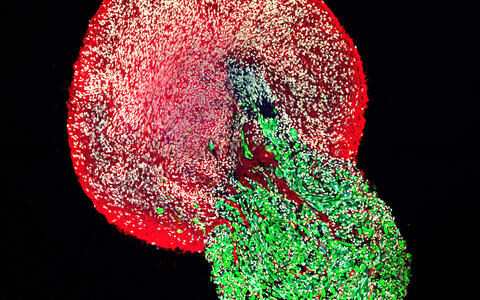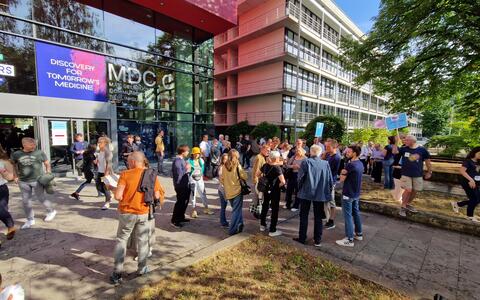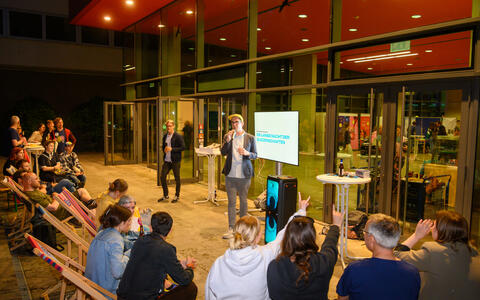Delve into the heart of research
The scientists at the Max Delbrück Center aim to transform medicine of tomorrow with their discoveries. But what does that mean exactly? During the Long Night, they will open the doors to their laboratories to the public and present their work. Some highlights from the program include:
Muscular organs
A section through a whole human neuromuscular organoid where spinal cord neurons (red) innervate the skeletal muscle cells (green). All cell nuclei are stained in white colour.
The walk-in heart. Day after day, our heart beats reliably about 100,000 times to ensure a constant supply of nutrients and oxygen to every corner of the body. But what does it look like? Together with researchers, guests can explore a walk-in model of the heart. Max Delbrück Center, Campus Buch, MDC.C, 4:00 pm to 11:00 pm.
A journey into the fascinating world of mini-organs. Organoids are tiny, self-organized 3D tissues derived from stem cells. Mina Gouti's team will share insights into how these mini-organs can be used to study diseases, test novel drugs and even produce transplants in the future. Max Delbrück Center, Campus Buch, registration at the info point in the MDC.C, 5:30, 8:30 pm (GER), 7:00 pm (EN).
Artificial intelligence in art and science
AI can replicate Bach, but not Händel (yet). Some algorithms that researchers use to analyze biological data sets can also compose music. Researcher and pianist Daniel Leon Perinan will explore whether and how well artificial intelligence can imitate compositions by Bach and Händel and play works by both composers. MDC-BIMSB, Hannoversche Straße 28, large conference room on the ground floor, 8.00 pm (EN).
How artificial intelligence is improving the life sciences. Can a chatbot help oncologists find the right therapy for cancer patients? Altuna Akalin develops AI tools that analyze genetic data and identify important characteristics for diagnosis and treatment – to benefit patients by offering them more precise treatment. Visitors can test these models for themselves at the interactive exhibition booth. MDC-BIMSB, Hannoversche Straße 28, 5:00 pm-12:00 am.
Studying individual cells
In Berlin-Buch, visitors showed great interest in the Long Night 2023.
Accompanying cells on their developmental journey. During embryonic development, a complete organism with many specialized cell types and tissues develops from a fertilized egg cell within just a few weeks. But how do our cells know whether they should become a heart, nerve or liver cell? And how do they communicate with each other to form complex tissues and organs? Markus Mittnenzweig will demonstrate how we learn more about organ formation with the help of computer models based on single-cell sequencing and organoids. MDC-BIMSB, Hannoversche Str. 28, registration at the info point, 6:00 pm, 9:00 pm (EN), 8:00 pm (GER).
Misfolded is toxic for the brain. Huntington's, Alzheimer's and Parkinson's disease all have one thing in common: misfolded proteins that accumulate in the brain and that poison nerve cells. Erich Wanker's research group uses the fruit fly as a model for neurodegenerative diseases in order to find the causes and effects of incorrect protein folding. Max Delbrück Center, Campus Buch, registration at the info point in the MDC.C, 5:00 pm (GER), 7:00 pm, 9:00 pm (EN).
Please touch: hands-on experiments
Please touch. James Poulet's group is investigating the properties of the somatosensory system and its neuronal circuits. How do we perceive touch and temperature? How can we accurately measure neurological signals? The team makes its research tangible in interactive scenarios. Max Delbrück Center, Campus Buch, MDC.C, 4:00 to 10:00 pm.
Lab olympics. Pipetting, measuring, finding information – at our Lab Olympics, children and adults can test whether they are well-suited for everyday laboratory work. A lab selfie is included. Max Delbrück Center, Campus Buch, MDC.C, 4:00 pm to 10:00 pm and MDC-BIMSB, Hannoversche Straße 28, ground floor, 5:00 pm to 12:00 am.
Pubquiz
The Long Night 2023 ends in Berlin-Buch with a pub quiz, hosted by Tom & Darren.
Of molecules, music and medals. Did you pay attention during the lectures and lab tours? Are you familiar with sports, music, the big and small things of everyday life? Then compete against each other in small groups in our PubQuiz and put your knowledge to the test! Everyone can contribute and join in the guessing – the focus is on the team. MDC-BIMSB, Hannoversche Straße 28, ground floor, 11:00 pm to 12:00 am.
Pub quiz with Tom & Darren. This quiz is great fun for all ages! A colorful live quiz game: you play against each other in small teams, answering questions about everyday, general and specialist knowledge. Whether expert or amateur, student or teacher, janitor or manager – the best team wins! Max Delbrück Center, Campus Buch, MDC.C, 10:00 to 11:00 pm.
Further information
Photos to download
- Pub quiz with Tom and Darren on campus Buch. Photo: Peter Himsel, CBB
- Meeting point for lab tours. Photo: Felix Petermann, Max Delbrück Center
- A section through a human neuromuscular organoid where spinal cord neurons (red) innervate the skeletal muscle cells (green). All cell nuclei are stained in white. Photo: Jorge Miguel Faustino Martins, Gouti Lab, Max Delbrück Center
Contact
Jutta Kramm
Head Of Communications
Max Delbrück Center
+49 (0)30 9406-2140
jutta.kramm@mdc-berlin.de or presse@mdc-berlin.de
- Max Delbrück Center
-
The Max Delbrück Center for Molecular Medicine in the Helmholtz Association (Max Delbrück Center) is one of the world’s leading biomedical research institutions. Max Delbrück, a Berlin native, was a Nobel laureate and one of the founders of molecular biology. At the locations in Berlin-Buch and Mitte, researchers from some 70 countries study human biology – investigating the foundations of life from its most elementary building blocks to systems-wide mechanisms. By understanding what regulates or disrupts the dynamic equilibrium of a cell, an organ, or the entire body, we can prevent diseases, diagnose them earlier, and stop their progression with tailored therapies. Patients should be able to benefit as soon as possible from basic research discoveries. This is why the Max Delbrück Center supports spin-off creation and participates in collaborative networks. It works in close partnership with Charité – Universitätsmedizin Berlin in the jointly-run Experimental and Clinical Research Center (ECRC), the Berlin Institute of Health (BIH) at Charité, and the German Center for Cardiovascular Research (DZHK). Founded in 1992, the Max Delbrück Center today employs 1,800 people and is 90 percent funded by the German federal government and 10 percent by the State of Berlin.








